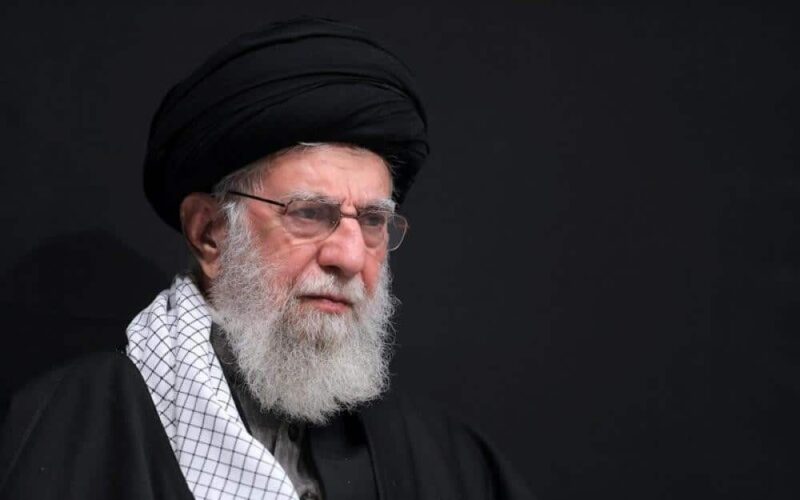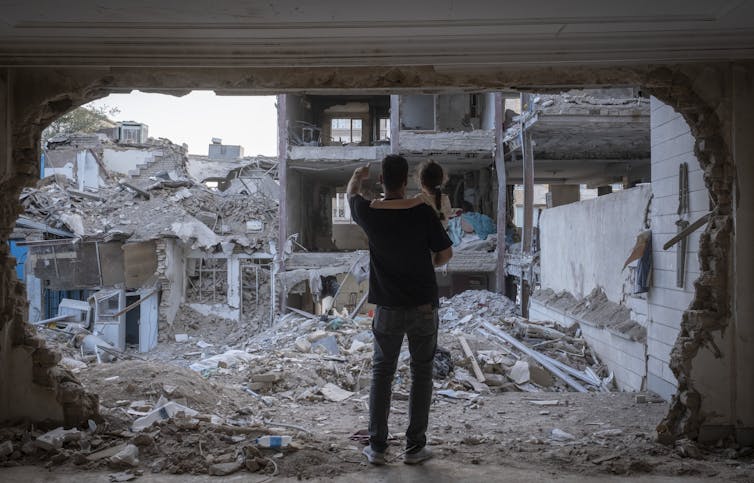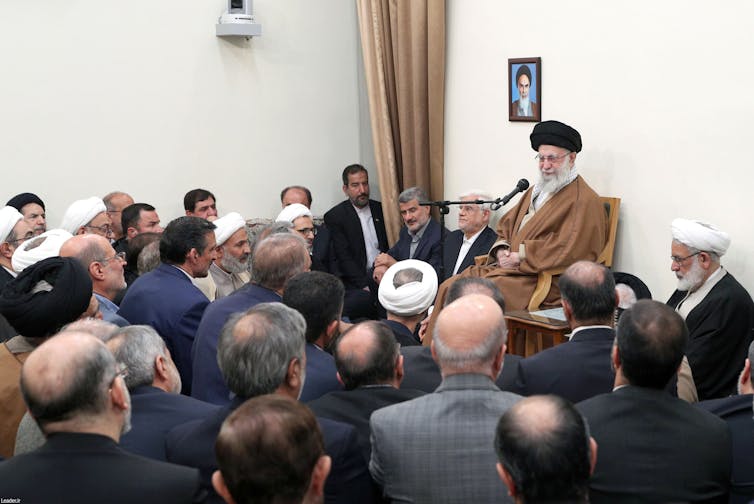Iran’s Supreme Leader in Tehran, July 5, 2025
Originally published by The Conversation:
In the weeks since Israel’s expansive 12-day war in June, Iran’s Supreme Leader Ayatollah Ali Khamenei has rarely been seen in public.
That absence has inevitably led to speculation over the 86-year-old’s health. But it also left many Middle East observers wondering about the future direction of the republic, and how its leadership will respond to possibly Iran’s biggest challenges since the Iran-Iraq War of the 1980s.
The attacks by Israel, and later the U.S., struck hundreds of targets across the country and resulted in the deaths of more than 1,000 people, including many of Iran’s top military commanders and nuclear scientists.
It was all the more stark for those in Tehran for how it caught the Islamic Republic by surprise. Indeed, Iran had been engaged in good-faith diplomatic talks with the United States.
It was, in the words of Hassan Rouhani, the former President and potential successor to Khamenei, a “wake-up call to correct our course and rebuild the foundations of governance.”
But will the leader heed that call? As a scholarof Iranian and Middle Eastern political affairs, I believe the conflict has provided the opportunity for the Iranian leadership to reestablish itself with some notion of regeneration that could appease both the traditional conservatives as well as those seeking reform with the domestic status quo.
The Ayatollah’s Greatest Dilemma
As Iran civilian and military targets were being hit by repeated Israeli airstrikes, and intelligence operations were picking off senior government and military officials, Khamenei was reportedly commanding from a safe bunker.
Already cognizant of the potential threat to his security before the latest conflict, the Supreme Leader is known to have considered contingency succession plans and seemingly named potential successors should he perish. These names were not publicly released but were rumored not to have included his son, Mojtaba Khamenei. Instead, it is speculated that they include some of his closest allies.
Being cloistered from the conflict and considering his potential imminent demise underscored just how under the spotlight Khamenei’s leadership has become. One of the world’s longest-serving leaders, he was once seen as the unifying axis of the Islamic Republic and the inheritor of the legacy of the Iranian Revolution’s founding father, Ayatollah Ruhollah Khomeini, the Supreme Leader is now facing rare scrutiny from various quarters.
An Iranian man carries a young girl and points at a destroyed residential building targeted amid Israel 12-day war, Tehran, Iran, July 21, 2025 (Morteza Nikoubazl/NurPhoto/Getty)
While Khamenei still earned official praise from elements of his coalition over the handling of the war, critics have questioned his strategic handling of the conflict with Israel, arguing that the confrontation exposed Iran’s military vulnerabilities without delivering meaningful gains – something Iran’s leaders have contested vehemently in their own evaluation of the conflict.
Meanwhile, some point to his advanced age and long-standing resistance to change as obstacles to the country’s political and economic revival, with even his closest adviser, Ali Akbar Velayati, suggesting now is the time for reform.
Reform or redouble?
Given this confluence of negative events and perceptions, Khamenei now faces a choice. He still commands deep loyalty among conservative domestic audiences and the security establishment, yet his government’s standing beyond that is receiving more critique than ever. At the same time, the postwar landscape has created an opening for reform that could shore up the Islamic Republic’s future, calm social pressures, and reopen doors to diplomacy and investment.
One path for Khamanei would be to remain as Supreme Leader but gradually delegate, signaling controlled change from within. Another, more dramatic option would echo Pope Benedict XVI’s precedent: a formal abdication that preserves his spiritual and symbolic standing. Khamenei would maintain a “Leader Emeritus” title, while transferring day-to-day authority to a successor empowered to introduce incremental reform without publicly diminishing him. Such a staged handover could let the system adapt, give younger elites political space, and allow policy shifts to proceed without the notion of losing credibility.
But there remains the reality that Khamenei’s loyal conservative followers command a strong pull with domestic audiences. And those factions, especially after the latest conflict, will be less inclined to consider reform and far more interested in cracking down on potential information leaks that led Israel to conduct such precise operations against military elites in the first place.
Yet given the position of the government, reform is inevitably on the agenda again. And some of the reforms being quietly discussed include loosening internet restrictions, particularly on popular social media platforms widely used by Iran’s large and youthful population.
Access to digital spaces has become not just a cultural and economic issue but a marker of generational culture. In the wake of the 2022 death of Mahsa Amini, whose detention by morality police and subsequent death led to widespread protests, Iran’s leaders have faced calls to revise the government’s strict morality laws. If the government made reforms to that end, which have already been unofficially and anecdotally reported in places, it could help ease tensions with women and younger Iranians without fundamentally challenging the system’s foundations.
On the international front, Iran has already begun to recalibrate its foreign policy, as reflected in its accession to the BRICS group of nations in 2024. This move suggests a desire to become less isolationist and to engage more actively on the global stage. Further steps could include seeking membership in other international institutions and organizations in exchange for commitments on regional and global issues, along with enhanced cooperation with nuclear watchdogs and regulatory bodies.
If successful, that might unlock long-stalled investment opportunities and trade partnerships, helping to revive an economy hit by years of U.S.-imposed sanctions and isolation. Each of these steps, while modest in isolation, could signal a broader shift – not in a full overnight transformation, but a cautious adaptation that shows a willingness to adapt.
The Million-Dollar Question
This is all related to the most pressing international question of Iran’s nuclear program, which remains unresolved despite the recent conflict and reported severe damage from U.S. bunker-busting strikes. Tehran continues to insist that its nuclear ambitions are purely peaceful and civilian in nature and would be loathe to abandon the program.
For the Islamic Republic, the program is more than a strategic deterrent; it stands as a marker of national pride and technological advancement. Whether under the current supreme leader or a future successor, the issue will remain central to the identity and long-term vision of the state.
Iran’s Supreme Leader holds a meeting with senior officials at his residence in Tehran, Iran, on April 15, 2025
Despite threats to pull out of the Nuclear Non-Proliferation Treaty during the recent conflict with Israel, Iran remains a signatory and maintains that its nuclear program operates within the bounds of international law.
Yet any move toward greater transparency or cooperation must be weighed against past experience. The 2015 nuclear agreement, once hailed as a diplomatic breakthrough, ultimately collapsed after the United States unilaterally withdrew and reimposed economic sanctions on Tehran during President Donald Trump’s first term. In the aftermath of the Iran deal’s fall, Iran was targeted by a series of covert operations and military strikes widely attributed to Israel or even – in the case of assassinated general Qassem Soleimani – the US. These events have reinforced skepticism within Tehran’s leadership about the reliability of Western commitments and the costs of compromise.
As such, while a more open and cooperative posture could in theory lead to eased sanctions, renewed trade and a path to international legitimacy, it also risks undermining Iran’s self-styled mantle of resistance to American and Israel regional policy. For any reformist shift to gain traction, it would have to reconcile Iran’s desire for economic recovery with the imperative of preserving ideological credibility at home and projecting resilience abroad.
All of this will weigh on Khamenei, who has overall say in all foreign and domestic policy matters. Choosing to reform while still alive and in power could allow him to shape his legacy on his own terms, preserving the core of the Islamic Revolution while gently steering the country toward necessary change.
In doing so, he may also find a rare balance between tradition and modernity that speaks to both loyal conservatives and a generation hungry for reform. The war, ironically, may have presented Khamenei with the opportunity to thread that needle. The big question now is, “Will he?”




UN Security Council votes down China, Russia push to delay Iran sanctions
http://www.iranintl.com/en/liveblog/202509195411
https://www.radiofarda.com/a/un-security-council-rejects-effort-to-delay-sanctions-from-being-reimposed-on-iran/33542016.html
Iranian Political Prisoner Dies After Medical Neglect in Prison
https://iranwire.com/en/women/145074-iranian-political-prisoner-dies-after-medical-neglect-in-prison/
Iran reels from sanctions snapback: rial plunges while officials downplay impact
https://www.iranintl.com/en/liveblog/202509195411
Western countries win UN vote to advance Iran sanctions ‘snapback’
https://www.iranintl.com/en/liveblog/202509195411
khaak bar sareh khamenei (shame on SL), even Somalia voted against iri.
https://www.radiofarda.com/a/un-security-council-plans-a-vote-on-iran-snapback-sanctions-ahead-of-deadline/33534949.html
Iran Calls for Islamic NATO: https://www.newsweek.com/iran-egypt-military-islamic-nato-middle-east-2129873
“Iran and Egypt are spearheading new calls for a NATO-style alliance in the Middle East as their leaders gather in Qatar on Monday for an emergency summit of the Organization of Islamic Cooperation (OIC). The proposal, spurred by Israel’s recent strike on a residential compound in Doha that housed Hamas negotiators, represents the most serious push in decades for a unified regional defense pact. The latest escalation reflects a dramatic shift in Middle Eastern security priorities. Following a 12-day series of Israeli attacks on Iranian targets earlier this year, ongoing strikes in Gaza, and Israel’s recent attack on Doha, Muslim leaders are increasingly portraying Israel as the destabilizing force across the region. Arab and Iranian officials warn that failure to act could leave states across the Middle East vulnerable to further Israeli operations. The emergency OIC summit is now seen as a pivotal moment to determine whether Muslim nations can transform calls for unity into a concrete collective security framework.”
Many Muslims have dreamed of such a security pact for decades. It was first formally proposed by the late Turkish politician, Necmettin Erbakan.
Exclusive: With Khamenei Unreachable, Iranian Officials Fear for His Health and the Regime
https://iranwire.com/en/news/144768-exclusive-with-khamenei-unreachable-iranian-officials-fear-for-his-health-and-the-regime/
Iran Evacuates Schools, Homes in Isfahan as Land Subsidence Worsens
https://iranwire.com/en/news/144729-iran-evacuates-schools-homes-in-isfahan-as-land-subsidence-worsens/
4,000 Iranian Aluminum Workers Enter 43rd Day of Strike
https://iranwire.com/en/news/144701-4000-iranian-aluminum-workers-enter-43rd-day-of-strike/
Maybe ommaat goosaleh (herd of sheep followers of khamenei) should watch
https://youtu.be/nScYY10EiQM?si=iD9pS3Jp2mPA2o0V
There was a time that “rahbareh farzaneh” (SL) use to be on top of what kosesher told his followers(shit he spewed out).
It was he who declared “we won’t negotiate, and there won’t be any wars”. You have to be a special kind of omaat ahmaagh(idiots followers) to buy this bullshit.
Khamenei says enemies imposing ‘no war, no peace’ scenario on Iran
https://www.iranintl.com/en/202509070414
Iran’s new missiles change the balance of power in the Middle East : https://www.atalayar.com/en/articulo/politics/irans-new-missiles-change-the-balance-of-power-in-the-middle-east/20250902100000217802.html
“In the context of the development of hypersonic weapons, which represents a strategic shift in the balance of power in the Middle East, Iran has made remarkable advances that redefine the rules of the military game in the region, challenging the superiority of the United States and Israel.”
Has Iran Beaten America and Israel in the Race for Hypersonic Weapons? https://nationalinterest.org/blog/buzz/iran-beaten-america-israel-race-hypersonic-weapons-bw-082725
“Now the Iranians are displaying their most potent weapon yet as a form of deterrence against a renewed round of airstrikes by Israel. Known as the “Acher al-Zaman” (sometimes translated as “End of Time” or “Apocalypse”), this hypersonic missile has sparked intense debates among defense analysts since it was unveiled by Iran’s military. If the Iranian claims about their new hypersonic missile are true, then, it could represent the greatest strategic threat to Israel’s security in the near future.”
The second strike: Why Iran’s preemptive response may come sooner than expected: https://www.middleeastmonitor.com/20250830-the-second-strike-why-irans-preemptive-response-may-come-sooner-than-expected/
“Iranian commanders, heirs to the men Israel killed at the start of the 12-day war, have made unprecedented public statements about what they intend to do. In contrast with the restraint of their predecessor, the new commanders speak of unleashing “fury and missiles on Israel from the first minute” of any war. This is a risk Iran is taking: rather than taking another beating and striking back in the same vein, Tehran appears to be committed to launching preemptive attacks to ensure its survival. The logic is ruthless. Iran hopes that, if war is unavoidable, then a preemptive strike improves its chances of survival.”
No worries, Israel will recruiting more members for your army of cardboard commanders….
https://www.instagram.com/reel/DNtGHitUHkq/?igsh=MW1hNml0dWY3NTdyZw%3D%3D
Devastating Iran missile attacks leave Israel with multibillion-shekel bill: https://www.ynetnews.com/business/article/b1ihi92tge
“More than 53,000 damage claims filed in just 12 days of war, including thousands of destroyed homes, businesses and cars; officials warn total losses, including indirect damages, will be far higher.”
https://www.instagram.com/reel/DNQe-sooGjA/?igsh=eGpzOHVvNXpid3hp
https://www.instagram.com/reel/DNWUqCrqQ0S/?igsh=ZG9iNHU3N3VtNzMy
Europe Triggers UN Sanctions Process Against Iran
https://iranwire.com/en/news/144382-europe-triggers-un-sanctions-process-against-iran-over-nuclear-program/
‘Persona Non Grata’: Iran Faces Growing International Isolation as Diplomatic Expulsions Mount
https://iranwire.com/en/features/144333-persona-non-grata-iran-faces-growing-international-isolation-as-diplomatic-expulsions-mount/
U.S defense officials admit the bombs dropped on Fordow did not penetrate the facility: https://www.nytimes.com/interactive/2025/08/20/world/middleeast/fordo-us-iran-nuclear-program-strike.html
“The bombs probably did not reach the chamber holding the centrifuges critical to Iran’s nuclear program, Defense Department officials said. The goal, they indicated, was to destroy them with shock waves and other effects of the blasts……The main shafts did not go straight down, said a Defense Department official familiar with the decision making, who spoke on the condition of anonymity to discuss operational matters. They zigged and zagged somewhat at the top, meaning that the path to the bunker was not a straight shot until toward the end.”
Each of the 30,000 lb bombs dropped, moreover, only contains 5,000 lbs of explosives.
For farsi speaking audience…..
https://www.youtube.com/watch?v=Yl35uYpzWmk
Not every mullah is a crook
Syria’s Airspace Ban Shows Iran’s Waning Regional Influence
https://iranwire.com/en/features/144128-syrias-airspace-ban-shows-irans-waning-regional-influence/
12-day war: videos reveal Iranian missile strikes censored by Israel: https://www.youtube.com/watch?v=UFTONTxiZGE
The extent of the damage at military sites in Israel remains unclear owing to censorship.
And the extent of sudden rash of “natural gas” explosions all over iran is under even greater “censorship”.
Even ommaat goosaleh(herd of cattle) who follow you are not that stupid.
Syria denied Iran security chief’s flight passage en route to Lebanon – Israeli paper
https://www.iranintl.com/en/202508146338
Iran says it detained 21,000 suspects during the June war with Israel: https://www.independent.co.uk/news/iran-b2806065.html
“A report by state TV quoted a police spokesperson, Gen. Saeed Montazeralmahdi, as saying people reported the suspects to the authorities. “The arrest of 21,000 suspects during the 12-day war indicated high awareness and participation of people in providing security.” Montazeralmahdi did not elaborate on what charges the suspects might face. However, he said more than 260 were suspected of spying and other 172 were arrested because of illegal filming.”
The Next Israel-Iran War Is Coming: https://foreignpolicy.com/2025/08/11/israel-iran-war-trump-nuclear-august-december/
“Israel is likely to launch another war with Iran before December—perhaps even as early as late August. Iran is expecting and preparing for the attack. It played the long game in the first war, pacing its missile attacks as it anticipated a protracted conflict. In the next round, however, Iran is likely to strike decisively from the outset, aiming to dispel any notion that it can be subdued under Israeli military dominance.”
“Contrary to Israel’s expectations, the killing of senior commanders from the Islamic Revolutionary Guard Corps did not lead to mass protests or an uprising against the Islamic Republic. Instead, Iranians of all political stripes rallied around the flag, if not the regime itself, as a wave of nationalism surged across the country.”
“As a scholarof Iranian and Middle Eastern political affairs, I believe the conflict has provided the opportunity for the Iranian leadership to reestablish itself with some notion of regeneration that could appease both the traditional conservatives as well as those seeking reform with the domestic status quo.”
Where your assertion is wrong is that you think the “leadership” has a principal position that holds to some sort of value system, and you build your position on that assumption. Wrongly or rightly there was a value system in 1979 revolt, but all that went out the window when they rewrote their constitution solely to serve khamenei well being. Every decision made is on that basis. Anything else is transient action, not even a decision. When khamenei dies there will be only one principal, who gets to seat around the honey pot. I have said this before and I say it again. You really need to learn to read and understand farsi for yourself to remotely assume you knowing psyche of a culture. I am a farsi speaking person, I.e. I do not really speak or fully understand azari language(a third of iranians speak it), as such, sometimes I don’t quite get their position on certain things right…. just sayin.